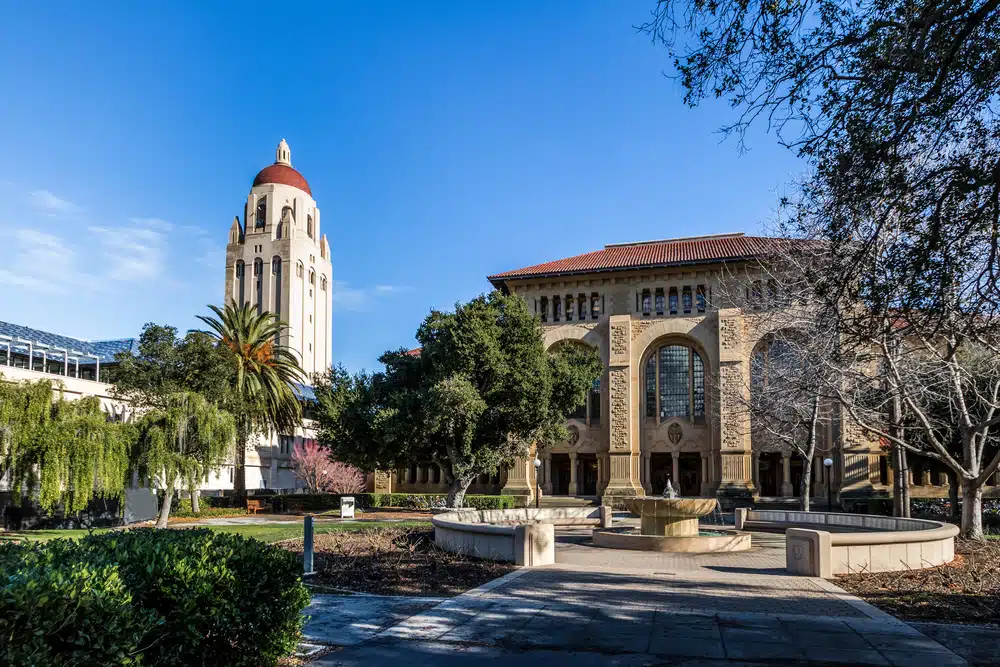The Stanford Debate Team: Achieving Excellence in Argumentation
Stanford University‘s reputation for excellence extends far beyond its rigorous academic programs. Among its many celebrated extracurricular activities, the Stanford Debate Team stands out as a paragon of intellectual rigor and argumentative prowess. Comprised of some of the planet’s brightest minds, the team has consistently showcased an impressive capacity for effective argumentation, resulting in numerous accolades and further bolstering the university’s esteemed reputation.
Understanding the Art of Argumentation
Before delving into the Stanford Debate Team’s ins and outs, it’s crucial to understand what debate is and why it is crucial. At its core, debate is the art of argumentation—a skill that, when honed, can significantly impact personal and professional spheres.
Debate is not simply a clash of opinions or a shouting match. It is a structured and disciplined form of communication that requires participants to present well-reasoned arguments supported by evidence. It is a platform where ideas are rigorously examined, challenged, and defended.
The art of argumentation goes beyond mere persuasion. It involves reasoning, discerning the strength of evidence, and persuasively presenting a case. These abilities are not only important for successful debating but are also critical life skills. Effective argumentation encourages critical thinking, fosters intellectual curiosity, and promotes engaged citizenship. In a rapidly evolving world where information is often complex and conflicting, the ability to argue effectively is incredibly valuable.
The Importance of Effective Argumentation
Argumentation is not simply about winning an argument—it is about communicating ideas effectively. It is about presenting a well-structured and compelling case that resonates with the audience. Whether it is in a formal debate setting, a professional negotiation, or a casual discussion among friends, the ability to articulate and defend one’s ideas is essential.
Effective argumentation requires careful preparation and research. It involves understanding the topic thoroughly, analyzing different perspectives, and anticipating counterarguments. By engaging in this process, individuals develop a deeper understanding of the subject matter and become better equipped to navigate complex issues.
Moreover, effective argumentation fosters empathy and understanding. When engaging in debate, individuals are forced to consider different viewpoints and challenge their own biases. This promotes open-mindedness and the ability to see issues from multiple angles.
Key Elements of Successful Argumentation
Success in argumentation doesn’t occur by accident—it takes a deep understanding of the topic at hand, logical structuring of arguments, articulate communication, and the ability to counter the arguments proposed by the opposition. It also demands patience, resilience, and most importantly, respect for one’s opponents.
Logical structuring of arguments involves organizing thoughts in a coherent and persuasive manner. This includes clearly defining the main points, providing supporting evidence and anticipating potential counterarguments. By presenting a well-structured case, debaters can effectively convey their message and increase the chances of persuading their audience.
Articulate communication is another crucial element of successful argumentation. Debaters must be able to express their ideas clearly and concisely, using language that is accessible to their audience. They must also be able to adapt their communication style to different contexts and effectively engage with diverse audiences.
Lastly, successful argumentation requires the ability to counter the arguments proposed by the opposition. This involves carefully listening to their points, identifying weaknesses in their reasoning, and providing strong rebuttals. By engaging in a respectful and intellectually rigorous exchange, debaters can challenge each other’s ideas and contribute to a deeper understanding of the topic.
The Journey of the Stanford Debate Team
The Stanford Debate Team’s journey is a testament to the power of argumentation. The team’s inception and early years were marked by small, but significant, successes and growth.
The Team’s Inception and Early Years
The Stanford Debate Team was founded in the late 19th century as a forum for students to engage in intellectual exploration outside the classroom. It began as a small, dedicated group of individuals with a shared passion for argumentation. These early members, fueled by their enthusiasm and desire to excel, would gather in cramped classrooms and lecture halls, spending countless hours honing their skills and refining their arguments.
Despite their humble beginnings, the team quickly gained recognition for their exceptional talent and dedication. Word of their impressive performances spread throughout the campus, attracting more students who were eager to join their ranks. As the team grew in size, so did their ambitions. They began participating in local debates, challenging other universities and showcasing their prowess in the art of persuasion.
With each debate, the Stanford Debate Team gained valuable experience and knowledge. They learned to adapt their arguments to different topics and audiences, constantly refining their strategies to maximize their chances of success. Their dedication to research was unparalleled, spending countless hours in libraries and pouring over books and articles to gather evidence and support for their arguments.
Notable Achievements and Accolades
Throughout its history, the Stanford Debate Team has received numerous recognitions and awards, solidifying its place among the top university debate teams. Their hard work and commitment have paid off, as they have consistently achieved remarkable results in various local, national, and international debates.
One of the team’s most notable achievements was winning the prestigious National Debate Championship. This victory was the culmination of years of hard work, preparation, and determination. The team’s exceptional performance and persuasive arguments left a lasting impression on the judges and their competitors, establishing Stanford as a force to be reckoned with in the world of debate.
In addition to their national success, the Stanford Debate Team has also made a name for themselves on the international stage. They have represented their university and country in prestigious international debate tournaments, where they have consistently performed at an exceedingly high level. Their ability to engage with diverse perspectives and effectively communicate their ideas across cultural boundaries has earned them respect and admiration from debaters around the world.
While the team’s achievements and accolades are undoubtedly impressive, it is their unwavering passion for argumentation and intellectual discourse that truly sets them apart. The Stanford Debate Team continues to inspire and challenge each other, pushing the boundaries of their capabilities and striving for excellence in every debate they participate in.
The Training Regime of the Stanford Debate Team
Success does not come without commitment and hard work. The Stanford Debate Team’s impressive accomplishments can be attributed to its rigorous training regime and the crucial role of its coaches and mentors.
Debate, as an activity, requires not only knowledge and critical thinking skills but also the ability to articulate arguments effectively and persuasively. The Stanford Debate Team understands this and has developed a training regime that pushes its members to excel in all these areas.
Rigorous Practice Sessions
The team practices regularly, often beyond the regular university hours. These practice sessions range from researching and constructing arguments on various topics to ‘mock’ debates that simulate real competitions. The team members engage in intense discussions, challenging each other’s ideas and refining their arguments.
During these practice sessions, the team also focuses on analyzing past competitions and learning from their performances. They review their strengths and weaknesses, identifying areas for improvement. This reflective approach allows them to grow and adapt their strategies accordingly.
Moreover, the Stanford Debate Team understands the importance of staying up-to-date with current events and relevant research. They dedicate time to reading scholarly articles, news reports, and opinion pieces to broaden their knowledge base and strengthen their arguments.
The team’s commitment to continual growth and improvement is a critical aspect of their success. They understand that excellence is not achieved overnight but through consistent effort and dedication.
The Role of Coaches and Mentors
Behind every successful team, there is a team of dedicated coaches and mentors. The coaches of the Stanford Debate Team, many of whom are accomplished debaters themselves, provide guidance, nurture talents, and instill the rigor and discipline necessary for high-level debating.
These coaches bring a wealth of experience and expertise to the table. They have competed at the highest levels of debate and understand the intricacies of the activity. Their insights and advice are invaluable in helping the team members refine their arguments, develop effective speaking techniques, and enhance their overall performance.
Furthermore, the coaches act as mentors, providing emotional support and motivation to the team. They understand the pressures and challenges that come with competitive debating and ensure that the team members feel supported and encouraged throughout their journey.
The Stanford Debate Team’s coaches also organize workshops and seminars to expose the team to different debating styles and strategies. They invite guest speakers, including renowned debaters and experts in various fields, to share their insights and provide additional learning opportunities.
In conclusion, the Stanford Debate Team’s training regime is a well-rounded approach that encompasses rigorous practice sessions, continuous learning, and the guidance of experienced coaches and mentors. It is through this comprehensive training that the team has achieved remarkable success in the world of competitive debating.
The Impact of the Stanford Debate Team
Over and above the team’s success in competitions, they have made significant contributions to the reputation of the University and have profoundly impacted the personal and professional growth of its students.
Contributions to the University’s Reputation
The successes of the Stanford Debate Team have played a part in elevating Stanford’s global stature. The team’s well-rounded representation and consistent achievements in debate competitions have showcased the university’s commitment to comprehensive education and intellectual rigor, aligning with Stanford’s reputation as one of the world’s premier academic institutions.
Moreover, the team’s reputation has attracted talented students from across the globe who are passionate about debate and intellectual discourse. These students recognize Stanford as a hub for fostering critical thinking, persuasive communication, and intellectual curiosity. As a result, the university has seen a steady increase in applications from highly motivated individuals seeking to join the prestigious Stanford Debate Team.
Furthermore, the team’s success has also led to increased visibility and recognition for Stanford within the academic community. The Stanford Debate Team’s participation in high-profile tournaments and their consistent ranking among the top debate teams have garnered attention from renowned scholars, researchers, and intellectuals. This recognition has not only enhanced the university’s reputation but has also fostered collaborations and partnerships with other esteemed institutions.
Influence on Students’ Personal and Professional Growth
For team members, being part of the Stanford Debate Team is a transformative experience. Not only do they gain invaluable skills in argumentation, but they also develop crucial traits such as resilience, discipline, and the ability to work collaboratively—qualities that serve them well beyond their years in academia.
Through rigorous training and intense competition, team members learn to think critically, analyze complex issues, and construct persuasive arguments. These skills not only enhance their academic performance but also prepare them for success in various professional fields. The ability to articulate ideas clearly and persuasively is highly valued in careers such as law, politics, public speaking, and business.
Moreover, the Stanford Debate Team provides a supportive and nurturing environment for personal growth. Team members form strong bonds with their peers, creating a close-knit community that fosters intellectual curiosity and encourages personal development. The team’s collaborative nature cultivates a sense of teamwork and camaraderie, allowing students to learn from one another and build lifelong friendships.
Many previous members have gone on to excel in different professional fields, thus exemplifying the long-term benefits of the debating experience. Stanford Debate Team alumni have become successful lawyers, politicians, journalists, and entrepreneurs. Their ability to analyze complex issues, construct persuasive arguments, and think critically has been instrumental in their professional achievements.
Furthermore, the skills and qualities developed through participation in the Stanford Debate Team extend beyond the realm of academia and professional success. Team members often report enhanced self-confidence, improved public speaking abilities, and a greater appreciation for diverse perspectives. These personal growth outcomes contribute to the holistic development of Stanford students, preparing them to be well-rounded individuals who can contribute positively to society.
The Future of the Stanford Debate Team
As the Stanford Debate Team continues to excel, it looks ahead to the future, aiming to extend its influence and success.
Upcoming Competitions and Challenges
The team anticipates an exciting and challenging year ahead with numerous competitions on the horizon. These competitions will test their ability to adapt and excel in diverse debate formats and a wide array of global and pressing issues. Yet, the team remains unfazed and is preparing rigorously to maintain their high standards and achieve even more.
Long-term Goals and Aspirations
In the long term, the Stanford Debate Team aspires to continue its tradition of excellence in argumentation. The team hopes to inspire future generations of students to participate and champion the art of debate, thus ensuring the continuation of their storied legacy.
By continuing to foster a culture of critical thinking, intellectual curiosity, and resilience, the Stanford Debate Team is poised to remain a prominent figure in university debating for years to come. In a world where effective argumentation is increasingly crucial, the team’s role in shaping discerning, thoughtful, and articulate individuals cannot be overstated.
If you want to discuss the matter to a greater extent or inquire about college admissions, look no further! Our experts here at AdmissionSight can help you! Here at AdmissionSight, we have over a decade’s worth of experience guiding students through the competitive admissions process to get accepted to the top universities in the world. Feel free to set up an appointment today to book your initial consultation.









































